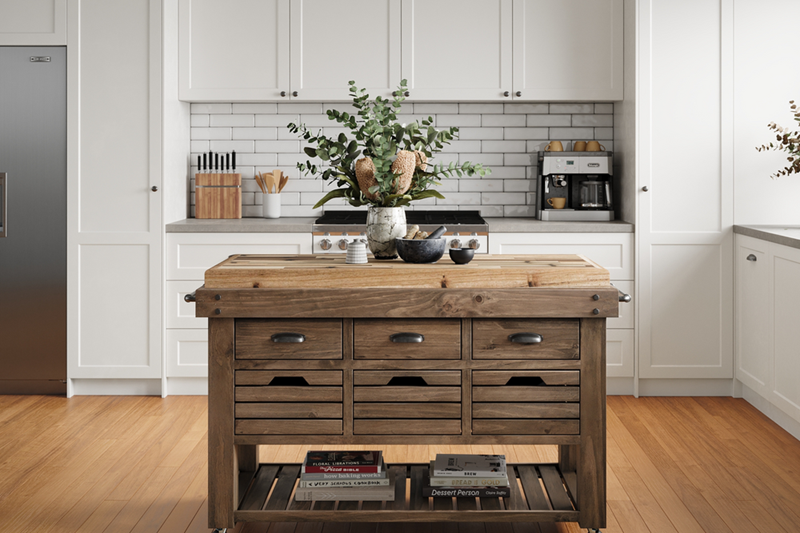If you're looking to create a warm and inviting kitchen, a butcher block countertop could be just what you need. These countertops got their name because butchers originally used them for cutting meat. Nowadays, they’re a popular choice for kitchens because they add a cozy, natural vibe and are generally more budget-friendly compared to pricier options like marble or granite. This counter also known as a kitchen trolley cart (because they often come with wheels and you can move them around), these countertops will turn your kitchen into the most inviting space in your house.
How Are Butcher Blocks Made?

Butcher blocks are made from real wood, which opens up many possibilities for how they can be made. Typically, they're made of strips and pieces of different wood types glued together in various patterns. The arrangement of the boards and the types of glue used can lead to a wide range of variations, with three main types.
- Edge Grain - Edge grain kitchen trolley cart is the most popular type. This style is known for its stability and strength, and it’s usually the most budget-friendly option compared to other methods.
- Face Grain - Face grain, or wide plank, is more commonly found in cutting boards than in countertops. This construction method isn’t as durable as edge or end grain styles, so it’s not the best choice for countertops. However, many people find this style to be the most visually appealing since you can see the full grain of each wood piece.
- End Grain - End grain countertops and cutting boards are the toughest types of butcher block. They’re also the priciest because of the complex construction process involved, which requires a lot of labour to create an end-grain countertop. The extra work needed to make these countertops results in a higher cost.
Hardness
Homeowners often rank hardness as the second most important factor when choosing a countertop, mainly because they plan to use it for heavy items and food prep. Even though it’s called a butcher block, it’s not the best choice for cutting fresh fruits or meats. While it’s gentler on your knives compared to materials like marble or granite, butcher blocks aren’t as hard as stone.
The hardness of your butcher block largely depends on the type of wood, but it won’t hold up well under pressure. That doesn’t mean they’ll break easily, but they just can’t handle force like stone can. If hardness is a big deal for you and you’re not keen on using a cutting board, a butcher block might not be the best fit. However, if you don’t plan on using your countertop for cooking too often, it could still work out just fine.
Can They Get Easily Damaged
Butcher block countertops aren't as tough as marble or granite. They can get damaged pretty easily from heavy items, blunt force, and scratches, which is worse than what you'd see with stone. They also have some other vulnerabilities, like being sensitive to water or liquids, which can lead to rot or discolouration. So, if you're thinking about putting a sink near your butcher block, it might not be the best idea.
Plus, they're not resistant to heat or stains, so if you have hot appliances nearby, they can get damaged. They can also shrink if the air is too dry or too humid. In short, butcher blocks can get easily damaged if not treated with care or if they're exposed to extreme temperatures, humidity, or water. While they might not be as durable as marble or granite, that doesn't mean they can't work for your countertops.
The Heat Resistance of Butcher Block Countertops
When it comes to cooking, heat resistance is a big deal for many people since they often work right next to their countertops. Unfortunately, butcher block countertops don’t handle heat well and can get seriously damaged if they come into contact with high temperatures. This means you definitely shouldn’t put a hot pot or pan directly on a butcher block; using a metal trivet is a smart move. If you stick to using trivets, your countertop should stay in good shape. In general, butcher blocks don’t hold up as well to heat compared to materials like marble or granite. However, if you place them wisely in your kitchen—keeping them away from stoves or ovens—you’re unlikely to see any major damage.
Maintenance
Butcher blocks need regular maintenance, especially the sealed ones that need re-sealing now and then. As long as you keep your countertop away from extreme heat, humidity, dryness, and water, it shouldn't be too hard to take care of. Just remember to clean and disinfect it regularly to keep things safe from contamination.
Unlike marble or granite, which can get damaged by harsh cleaners like ammonia, vinegar, or bleach, you can actually use these on a butcher block countertop if they're diluted.
It's a good idea to apply mineral oil, but make sure to wipe off any excess oil right away. For cleaning, a damp cloth with some dish soap works well, and if you have any stubborn stains, sandpaper can help tackle those.